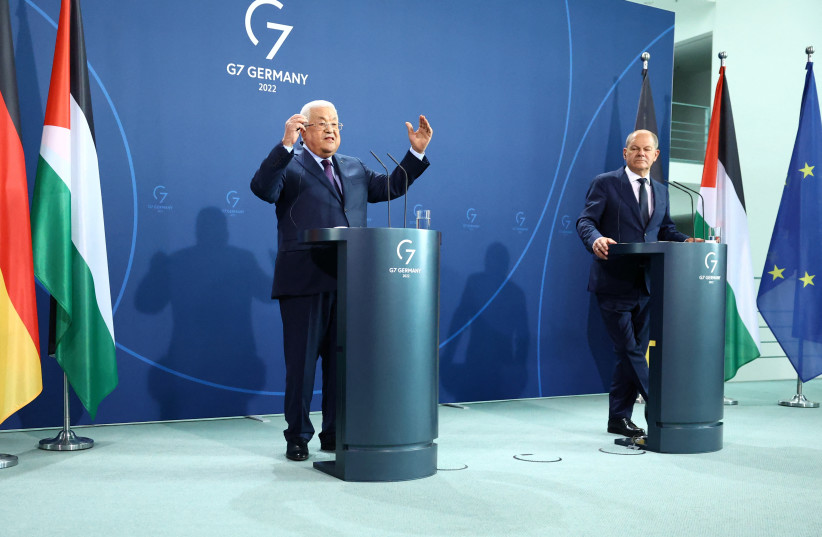Consider this item from the BBC’s website: “Palestinian leader Mahmoud Abbas has apologized for remarks he made about Jewish people and the Holocaust. In a statement issued by his office... he described the Holocaust as the ‘most heinous crime in history.’”
Sounds like a pretty straightforward account of Abbas’s “clarification” of his comments on Tuesday in Munich (of all places) saying that Israel has carried out “50 holocausts” against the Palestinians, right?
Wrong.
The above item is from a BBC report from May 4, 2018. Then, too, Abbas – who once wrote a book minimizing the Holocaust based on his doctoral dissertation at a Soviet university – was forced by international outrage to walk back comments about that singular historic event.
At that time, Abbas – about whom the BBC wrote with British understatement that he had in the past “stirred controversy with his thoughts on Jewish history” – said the genocide against the Jews in Europe was the result of Jewish financial activities, not antisemitism.

“So the Jewish question that was widespread throughout Europe was not against their religion but against their social function, which relates to usury and banking and such,” Abbas said back then.
“So the Jewish question that was widespread throughout Europe was not against their religion but against their social function which relates to usury and banking and such."
Palestinian Authority head Mahmoud Abbas, circa 2018
Slammed for repeating “some of the most contemptuous antisemitic slurs,” as then-UN special Mideast envoy Nickolay Mladenov said, Abbas trotted out his “most heinous crime in human history” statement, and the storm was calmed.
So the spin doctors in Abbas’s office on Wednesday, scratching their heads and wondering how they could calm the furor over his most recent Holocaust obscenity, didn’t have to be too creative. All they had to do was dig back into the Abbas playbook and pull out the same quote, almost word for word, and the storm would be calmed this time as well.
“President Mahmoud Abbas reaffirm[s] that the Holocaust is the most heinous crime in modern human history,” the Palestinian news Agency WAFA reported on Wednesday.
So there. No harm, no foul.
But this is foul, very foul, and on several different levels.
What is the harm done to Abbas?
It is foul because it is a vile falsification of history. It is foul because it obscenely trivializes the Holocaust. It is foul because it is an antisemitic libel aimed at demonizing the Jewish state.
It is foul because it plays into the narrative that still holds sway in much of the Mideast that the West created Israel as a form of “compensation” for the Holocaust. However, if the Jews themselves perpetrated “50 holocausts,” as Abbas believes, then there is no justification in the world for the creation of the State of Israel as compensation for “just one.”
Abbas has in the past already denied that there were any Jewish temples in Jerusalem, thereby denying any historical or religious justification for a Jewish state in this part of the world. Now he is undermining any moral justification.
It is also foul because it pollutes any chance of dialogue between Israelis and Palestinians. CNN, the BBC, The New York Times and Fox News will report his statement and Abbas’s “clarification,” and then move on. It will be forgotten by the next news cycle.
Israelis, however, will remember it, maybe not the exact words, but the overriding sentiment.
And, wouldn’t you know it, it is with those Israelis – not Amnesty International and Human Rights Watch, two organizations that will surely give Abbas a pass for these comments – with whom Abbas needs to make peace. These comments don’t build a whole lot of confidence among Israelis that there is anyone on the other side right now with whom they are able to make peace.
This is especially true this week. Just two days before Abbas’s comments in Munich, Hamas and Palestinian Islamic Jihad labeled “heroic” the act of a Palestinian terrorist who opened fire in Jerusalem and wounded eight people, including critically wounding a 26-year-old pregnant woman who he shot in the stomach.
Peace begins in the hearts and the minds. These comments from both ends of the Palestinian leadership spectrum, Hamas on one end and Fatah on the other, are not exactly winning over the hearts and minds of Israelis who will have to agree to any concessions for peace.
“Please come to peace,” Abbas said at the end of his Munich comments, addressing Israelis. “Please come to security. Let’s build trust between us and you.”
Huh?
In one press conference, Abbas accuses Israel of “50 holocausts” against the Palestinians, and then talks of building trust?
That combination obviously can’t work, and Abbas knows it. How do we know he knows it?
Because in March 2014, on the eve of Holocaust Remembrance Day in Israel, a week after he signed a reconciliation agreement with Hamas and just as the John Kerry-led talks between Israel and the Palestinians were on the verge of their ultimate collapse, Abbas sought to appeal to the Israeli public.
And the way he made that appeal was by saying the Holocaust was “the most heinous crime to have occurred against humanity in the modern era.” Sound familiar? Almost word-for-word the same expression he used on Wednesday.
This was lauded in some quarters as a groundbreaking acknowledgment by the Palestinian leader of Jewish suffering during the Holocaust.
At the time, then-prime minister Benjamin Netanyahu, however, was not having any of it. In an interview on CNN, Netanyahu said, “I think what President Abbas is trying to do is to placate Western public opinion that understands that he delivered a terrible blow to the peace process.”
“I think what President Abbas is trying to do is to placate western public opinion that understands that he delivered a terrible blow to the peace process.”
Former prime minister Benjamin Netanyahu
Words tragically as true today, as they were eight years ago.
